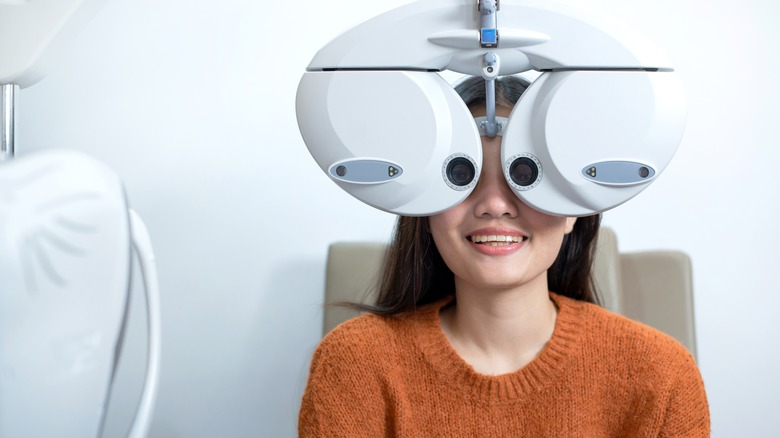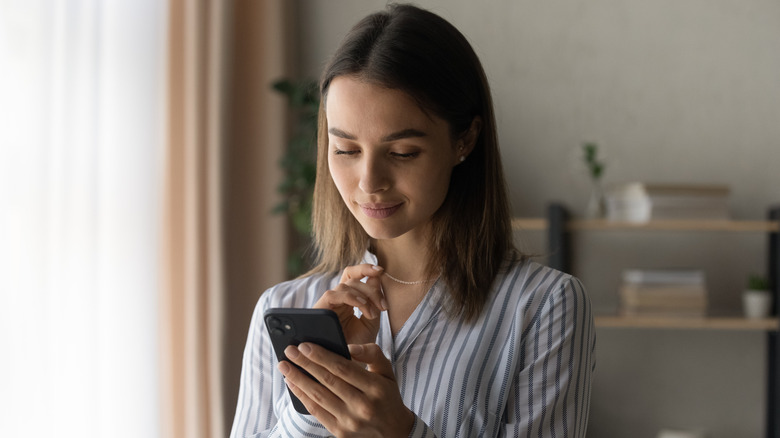How To Protect Your Eyesight As You Age, According To An Optometrist - Exclusive
Are you squinting to read small text or see objects far away? Or can you hardly see a thing without your contacts? You're not alone. Cleveland Clinic suggests that around 65% of American adults have less than 20/20 vision. And with age, the odds of having vision problems only increase. A number of age-related eye problems, including dry eyes, cataracts, glaucoma, and diabetes-related retinopathy, can lead to eye damage and loss of vision in later years.
No matter your age, there are steps you can take now to protect your eyesight later. In fact, The IAPB Vision Atlas reports that 90% of people have vision loss that can be prevented or treated, proving that all hope is not lost. The List spoke with Dr. Ramin Rabbani, a certified optometrist at Eye Candy Optometry, and innovative lens company Shamir, to find out how to prevent age-related eyesight issues in daily life.
Healthy lifestyle habits can improve your eyesight
According to Dr. Ramin Rabbani, many of the lifestyle habits that keep your body healthy also help your eyes. Specifically, Dr. Rabbani suggests eating a healthy diet packed with leafy greens, such as kale and spinach. These veggies contain lutein, zeaxanthin, and vitamin C — all of which are key nutrients for eye health, per Medical News Today. Loading up on dark green salads or adding a handful of these veggies to your morning smoothie may go a long way in protecting your eyesight.
Dr. Rabbani also shared some lifestyle habits that don't serve your eyes. Namely, smoking. He recommends that anyone looking to maintain their eye health as they age kick cigarettes to the curb. And research backs up this suggestion. The U.S. Food and Drug Administration says that smoking cigarettes can cause eye diseases that lead to vision loss and even blindness. Therefore, quitting smoking helps to lower your risk of developing these eye conditions.
Protect your eyes from environmental dangers
What you put into your body, like leafy greens, and what you keep out of it, like cigarette smoke, can have a major impact on your eyesight. But it's crucial to not overlook the environmental dangers that may come in direct contact with your eyes.
Dr. Ramin Rabbani says that it's important to wear UV-blocking eyewear and hats to avoid sun damage to the eyes. John Hopkins Medicine states that UV light is harmful to nearly every part of the eye, speeding up eye aging and triggering vision loss. UV-protective sunglasses and hats are an effective way to shield the eyes and face when outdoors.
It's also essential to keep an eye (no pun intended) out for what comes in contact with your eyes. Dr. Rabbani says to minimize chemicals around the eye area. If you work with chemicals, wear protective goggles and avoid rubbing your eyes without first washing your hands. But also be mindful of everyday chemicals — even eyeliner can damage your eyes and potentially harm your vision if not applied carefully.
Step away from the screens
According to Nielsen (via Forbes), people spend up to 12 hours of leisure time each day in front of screens. Combining that with work time, it's safe to say that many people are spending most of their waking hours in front of a TV, computer, or phone screen.
But Dr. Ramin Rabbani urges you to break your screen time habit and step away from your devices to save your eyesight. "Take 20-30 minute breaks from the computer ... Holistically, it's best to walk away from the near task to activate your body's blood flow and then hydrate." You can do this using the 20-20-20 rule. Healthline explains that the rule is a useful eye exercise for those who spend prolonged time in front of screens. It involves looking away from the screen every 20 minutes at something 20 feet away for a minimum of 20 seconds. But, as Dr. Rabbani suggests, longer breaks to get moving and grab a drink may be better for both your eyes and entire body.



